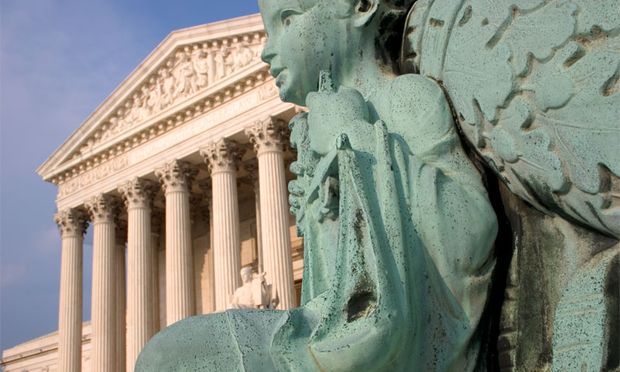 The Fifteenth Amendment, adopted five years after Civil War ended, was designed primarily to secure the right to vote for newly-freed slaves. Section 1 of the Amendment provides that “The right of citizens of the United States to vote shall not be denied or abridged by the United States or by any State on account of race, color, or previous condition of servitude.”
The Fifteenth Amendment, adopted five years after Civil War ended, was designed primarily to secure the right to vote for newly-freed slaves. Section 1 of the Amendment provides that “The right of citizens of the United States to vote shall not be denied or abridged by the United States or by any State on account of race, color, or previous condition of servitude.”
Section 2 grants to Congress an additional enumerated power: “The Congress shall have power to enforce this article by appropriate legislation.” This provision, like the similar enumerated power granted by the Fourteenth Amendment, often has been compared to the Necessary and Proper Clause.
It is unclear why the enumerated powers in the Fourteenth and Fifteenth Amendments are compared to the Necessary and Proper Clause. The Necessary and Proper Clause is technically redundant—that is, it merely clarifies that what would be true in any event. But Section 2 of the Fifteenth Amendment, like Section 5 of the Fourteenth Amendment, actually does grant Congress entirely new authority.
The reason the provisions are compared may be because the powers in both the Fourteenth and Fifteenth Amendments are to pass “appropriate” legislation. And in the famous case of McCulloch v. Maryland, Chief Justice Marshall described the Necessary and Proper Clause as permitting “appropriate” laws. (Note, however, that the meaning of “appropriate” in Marshall’s time was narrower than it is today.)
Anyway, over the past few decades the Supreme Court has permitted Congress to adopt all sorts of laws pursuant to the Necessary and Proper Clause that are not really “appropriate” in either the original or modern sense of the word. The effect has been to almost destroy most of the original Constitution’s limits on congressional authority.
Apparently, the Court has decided that it will not make the same mistake when interpreting the enumerated powers in the Fourteenth and Fifteenth Amendments. Instead, the Court has tried to limit Congress to a narrower scope. In Fourteenth Amendment cases, for example, the Court states that “There must be a congruence and proportionality between the injury to be prevented or remedied and the means adopted to that end.” In other words, the remedy must be connected to the problem, and can’t be exaggerated or greatly exceed the scope of the problem.
Shelby County v. Holder, the Court’s latest voting rights decision, actually was a very easy case. This is because the law in question was completely without “congruence” or “proportionality” to any real problem. In fact, the evidence suggested that there was no longer a significant problem at all.
At one time there was. Many states were involved in elaborate schemes to prevent African-Americans from voting. Accordingly, in 1965 Congress exercised its Fifteenth Amendment authority by adopting the Voting Rights Act. Section 2 of that law imposed certain mandates on all parts of the country. Section 5 imposed additional requirements on selected parts, and Section 4 provided the formula for determining which parts would receive the special treatment of Section 5. One result was that states with a history of discriminating against African-American voters were required to obtain federal approval before changing any election procedures.
Time passed, and discriminatory ways were abandoned, Yet Congress did not narrow Section 4’s formula to bring it up to date. On the contrary, Congress re-authorized the formula and even expanded it. By 2013, states with excellent records of minority voting were still being punished for misdeeds long in the past. Congress had chosen to visit the iniquity of the ancestors on future generations. In fact, Congress had chosen to punish many alive today who did not even have any culpable ancestors.
Thus, the Court voided Section 4 because it was no longer “appropriate legislation,” leaving Congress free to adopt a more appropriate substitute.
Justice Thomas concurred with the result, but wrote separately to say that he would also invalidate Section 5, the list of specified penalties to be imposed on states singled out by Section 4. Thomas is an African-American son of the segregated South. But he pointed out that the evils the law was designed to solve had long since been solved. There was no longer reason for federal meddling in matters the Constitution ordinarily reserves to the states.
In the wake of the Court’s decision, some cynical political operators have tried to provoke hysteria among the ignorant. To a certain extent they have succeeded: One citizen asked me recently about “that decision that took away our right to vote.”
Of course, the decision takes away no one’s right to vote. It merely makes it tougher for Congress to play racial politics. And as a matter of sound constitutional law, it seems to me that the justices really didn’t have much choice.
- The Truth about the Much-Abused Commerce Clause - February 28, 2024
- The Meaning of “Regulate Commerce” to the Constitution’s Ratifiers: An Update - February 7, 2024
- Why It May be Impossible to Disqualify Trump from the Presidency - January 8, 2024

